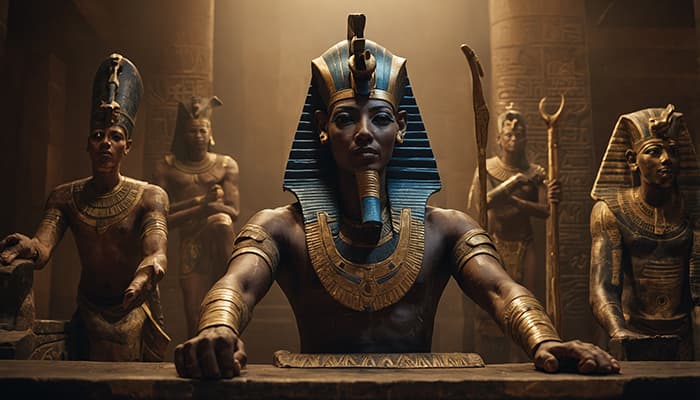Egyptian Mythology – 10 Gods of Ancient Egypt | Epic Legends

Egyptian Mythology – 10 Gods of Ancient Egypt
Welcome to our journey into the mystic world of ancient Egypt! Today, we’re diving deep into Egyptian mythology to explore the top 10 gods who shaped one of the most fascinating civilizations in human history. From the sun god Ra to the underworld ruler Osiris, these deities were worshipped and revered for thousands of years. Let’s get started!
1: Ra – The Sun God

Ra, the mighty sun god, was considered the king of the gods in ancient Egyptian religion. He was believed to sail across the sky during the day and travel through the underworld at night, defeating chaos and ensuring the sun would rise again each morning. Egyptians saw Ra as the source of all life, and many pharaohs claimed to be his descendants.
2: Osiris – God of the Afterlife

Next, we have Osiris, the god of the afterlife, resurrection, and fertility. Osiris was one of the most important deities, representing death and rebirth. He was murdered by his brother Seth, but thanks to the devotion of his wife, Isis, Osiris was resurrected and became the ruler of the underworld. He was the final judge of souls, determining who was worthy of eternal life.
3: Isis – Goddess of Magic and Motherhood

Isis, the goddess of magic, motherhood, and healing, was the wife of Osiris and the mother of Horus. She was known for her incredible magical abilities, which she used to protect her family and to resurrect Osiris. Isis was a beloved figure in Egyptian mythology, symbolizing maternal devotion, protection, and the power of love.
4: Horus – God of the Sky and Kingship

Horus, the falcon-headed god, was associated with the sky, war, and kingship. He was the son of Osiris and Isis and was revered as the protector of the pharaohs, who were considered to be his earthly embodiments. Horus is most famous for avenging his father’s death by defeating his uncle Seth in a legendary battle.
5: Seth – God of Chaos and Deserts

Seth, the god of chaos, deserts, and storms, was both a protector and a destroyer. Although he murdered his brother Osiris, Seth was also seen as a necessary force of balance, representing the unpredictability of life. He was often depicted as an adversary to Horus, symbolizing the eternal struggle between order and chaos.
6: Anubis – God of Mummification

Anubis, the jackal-headed god of mummification, was the guardian of the dead and the overseer of funerary rites. He played a crucial role in guiding souls to the afterlife and was responsible for weighing their hearts against the feather of Ma’at, the goddess of truth, to determine their fate in the afterlife.
7: Thoth – God of Wisdom and Writing

Thoth, the god of wisdom, writing, and knowledge, was believed to be the inventor of hieroglyphics and a scribe for the gods. He was often depicted as an ibis-headed deity and was revered as a mediator, helping to maintain the balance of the universe. Thoth’s wisdom was unmatched, and he played a key role in many myths, including the judgment of the dead.
8: Hathor – Goddess of Love and Music

Hathor, the goddess of love, beauty, music, and motherhood, was one of the most popular deities in ancient Egypt. She was seen as a nurturing mother figure and a protector of women. Hathor was often depicted as a cow or a woman with cow horns, symbolizing fertility and nourishment.
9: Bastet – Goddess of Home and Protection

Bastet, the goddess of home, fertility, and protection, was worshipped as a fierce lioness and later as a domestic cat. She protected homes and families and associated with music, dance, and joy. Bastet’s dual nature as a nurturing and fierce deity made her a beloved and respected figure.
10: Amun – The Hidden One

Finally, we have Amun, known as “The Hidden One.” Amun rose to prominence in the New Kingdom, becoming a national god of Egypt. He was often merged with Ra to become Amun-Ra, the king of the gods. Amun was associated with creation, power, and kingship, and his temple at Karnak was one of the most important religious sites in ancient Egypt.
These ten gods only scratch the surface of the rich and complex mythology of ancient Egypt. Each deity played a vital role in the lives of the ancient Egyptians, influencing their culture, politics, and daily life. If you enjoyed this journey through Egyptian mythology, don’t forget to like, share, and subscribe for more fascinating explorations into ancient history and mythology!